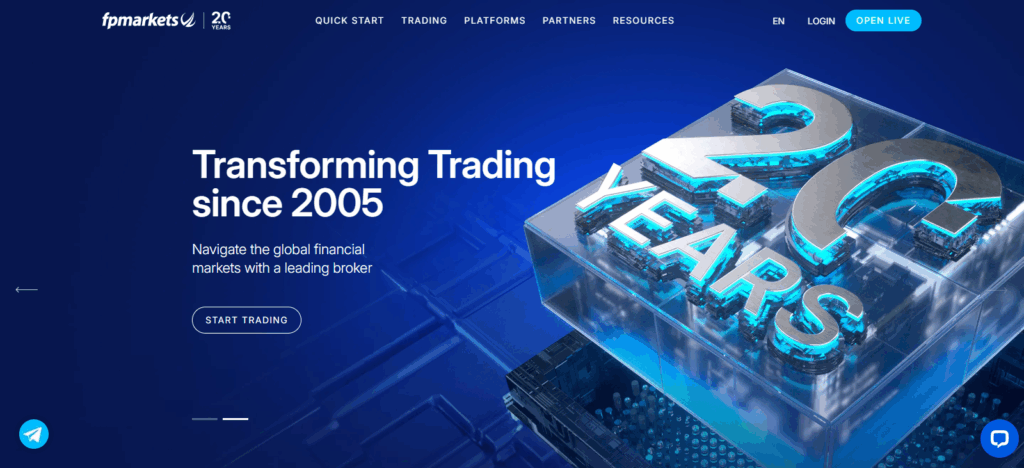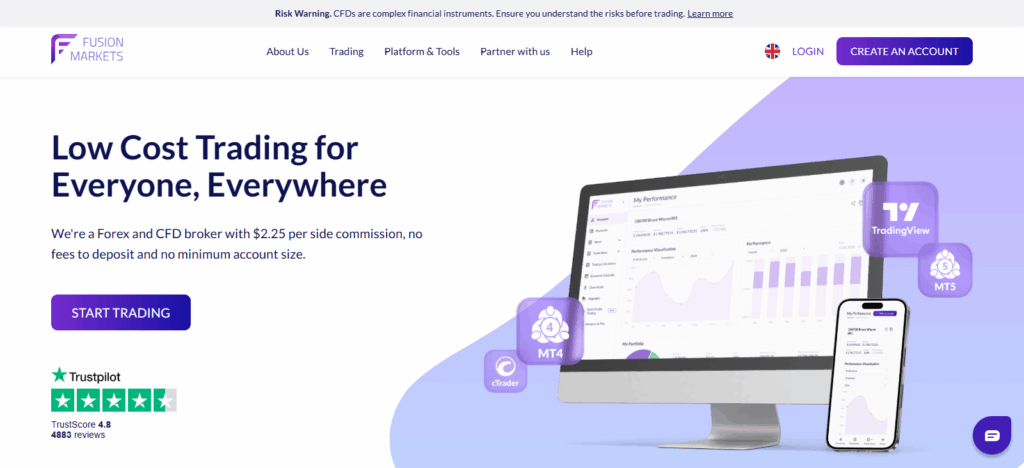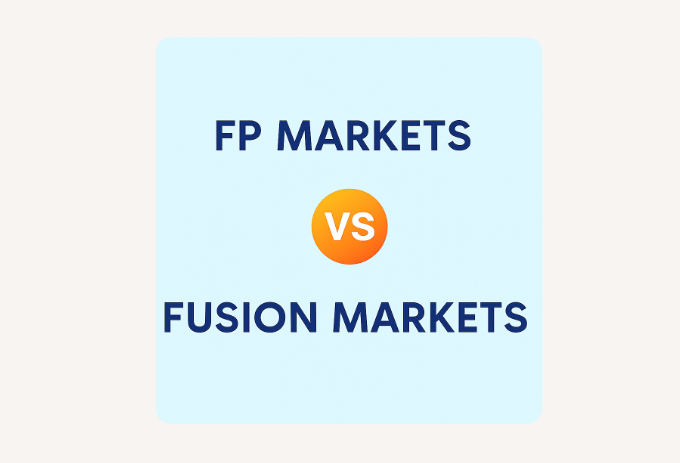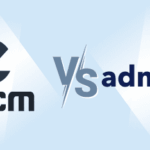FP Markets vs Fusion Markets – two top forex brokers which harness technology, low spreads, and solid regulation.
While FP Markets shines with its time-tested global licenses, global reputation and range of instruments, Fusion Markets is recognized for its ease of use and ultra-low trading costs.
This comparison assesses their main features, costs, platforms and reliability in order to help traders decide, by 2025, which broker is most aligned with their trading aspirations.
What Is FP Markets?
Established in 2005, FP Markets has gained a reputation as a transparent, low-spread, technology-oriented broker specializing in forex and CFDs. Offers traders access to more than 10,000 instruments, including forex, commodities, indices, stocks, and cryptocurrencies.

Offers powerful MetaTrader 4, MetaTrader 5, and Iress platforms and provides fast execution with deep liquidity to beginners and professionals. Provided by top-tier regulators like ASIC and CySEC. FP Markets has advanced. Provided by top-tier regulators like ASIC and CySEC. FP Markets has expanded.
What Is Fusion Markets?
Founded in 2017, and based in Australia, Fusion Markets is an Australia Regulated ASIC and VFSC CFDS and Forex broker. This broker is known for its ultra-low trading costs and exceptional customer service.

They provide trading on Forex, Commodities, Indices, Shares and even Cryptocurrencies. They provide MT4, MT5 and cTrader platforms which provide high execution and flush Fast and clean FIX API which is something professional traders look for.
Broker Overview: FP Markets vs Fusion Markets
| Category | FP Markets | Fusion Markets |
|---|---|---|
| Trading Critique Score | 9 | 9 |
| Broker Type | ECN Broker | ECN Broker |
| Established Year | 2005 | 2017 |
| Customer Base / Number of Accounts | No information available | No information available |
Regulation & Security
| Aspect | FP Markets | Fusion Markets |
|---|---|---|
| Regulated By | ASIC, CySEC, FSCA, FSA, SVG | ASIC, VFSC, FSA |
| Awards (Last 2 Years) | Best CFD Broker – Africa, Best Trading Experience – Africa, Most Trusted Broker 2023, Best Price Execution 2024, Most Transparent Broker 2024, Best Trading Conditions 2024 | Best MetaTrader Broker, Lowest Spread Forex Broker, Lowest Commission Forex Broker (2023, 2024) |
| Security Measures | No | No |
| SSL Encryption / 2FA | Yes | Yes |
| Segregated Funds | Yes | Yes |
| Negative Balance Protection | Yes | Yes (restricted in some regions) |
Trading Instruments / Products Offered
| Instruments | FP Markets | Fusion Markets |
|---|---|---|
| Total Trading Instruments | 10,000+ | 12+ (including metals, energies, and US share CFDs) |
| Currency Pairs | Yes | Yes |
| Commodities | Yes | Yes |
| Indices | Yes | Yes |
| Cryptocurrencies | Yes | Yes |
| CFDs | Yes | Yes |
| ETFs | Yes | No |
| Stocks | No | No |
| Options | No | No |
| Futures | No | No |
| Bonds | Yes | No |
| Mutual Funds | No | No |
| Fractional Shares | No | No |
| ETNs | No | No |
| Precious Metals | Yes | Yes |
| REITs | No | No |
| Equities | No | Yes |
Typical Spreads and Fees: FP Markets vs Fusion Markets
| Fee Type / Instrument | FP Markets | Fusion Markets |
|---|---|---|
| Average Trading Cost (EUR/USD) | 1.2 pips | 0.3 pips ($3.00) |
| Average Trading Cost (GBP/USD) | 1.4 pips | 1.4 pips ($14.00) |
| Average Trading Cost (WTI Crude Oil) | $0.02 | $0.02 |
| Average Trading Cost (Gold) | $0.16 | $0.11 |
| Average Trading Cost (Bitcoin) | $21.08 | $48.00 |
| Minimum Raw Spreads | 0.0 pips | 0.0 pips |
| Minimum Standard Spreads | 1.0 pips | 0.9 pips |
| Minimum Commission for Forex | $6.00 per round lot | $4.50 per lot |
| Deposit Fee | No | No |
| Withdrawal Fee | No | N/A |
| Inactivity Fee | No | N/A |
Restricted Countries: FP Markets vs Fusion Markets
| Broker | Restricted Countries |
|---|---|
| FP Markets | United States (US), Japan (JP), Belgium (BE), New Zealand (NZ), Syria (SY) |
| Fusion Markets | United States (US), Canada (CA), Iran (IR), Syria (SY), New Zealand (NZ) |
Trading Platforms & Technology: FP Markets vs Fusion Markets
| Feature | FP Markets | Fusion Markets |
|---|---|---|
| Trading Platform Availability | Yes | Yes |
| MetaTrader 4 (MT4) | Yes | Yes |
| MetaTrader 5 (MT5) | Yes | Yes |
| cTrader | Yes | Yes |
| Social Trading | Yes | No |
| Copy Trading | Yes | Yes |
| Other Proprietary Platforms | No | No |
| Platform Compatibility (Windows, Mac, iOS, Android) | Yes | Yes |
Is FP Markets financially regulated?
Financial regulation of FP Markets is a focus of the company, it was established in 2005, it is regulated with a high degree of stringency throughout the world.
FP Markets is regulated by ASIC (Australia), the CMA (Kenya), CySEC (Cyprus), FSC (Mauritius), FSCA (South Africa), and FSA (Seychelles).
With these licenses, FP Markets demonstrates protection of clients’ funds, and ensures safe and sound practices of international trading.
Is Fusion Markets financially regulated?
Since 2017, Fusion Markets has been in the business as a fully regulated broker with a supervision certificate from ASIC (Australia) and the VFSC (Vanuatu Financial Services Commission).
Fusion Market has accrued the guarantee of compliance and secured fair trading practices for all clients.
Here’s a breakdown of the pros & cons for each broker — FP Markets and Fusion Markets — based on the details you provided plus what I found from recent reviews:
FP Markets Pros & Cons
Pros:
- Regulated by Tier-1 authorities like Australian Securities & Investments Commission (ASIC) and Cyprus Securities and Exchange Commission (CySEC), giving a strong regulatory framework.
- Offers very low spreads on its ECN/raw account (e.g., from ~0.0 pips) and competitive pricing overall.
- Large selection of instruments (10,000+ tradable symbols) which gives traders a wide market access.
- Multi-platform support including MT4, MT5, cTrader, etc.
- Strong execution speed, which is beneficial for active traders.
Cons:
- Their mobile app and some platform features are regarded as average compared to leading peers.
- Some advanced educational resources or research tools are not as comprehensive as top brokers.
- Minimum deposit and account costs may be higher for certain account types (e.g., the IRESS platform).
- Some withdrawal/terms issues: e.g., international bank withdrawals may be slower.
Fusion Markets Pros & Cons
Pros:
- Strong cost appeal: very low trading costs, tight spreads, and low (or no) minimum deposit requirements in many jurisdictions.
- The oversight provided by ASIC (for the Australian entity) is a good base level of regulation. (Brokersway)
- They have a good range of trading platforms (MT4, MT5, cTrader) and efficient account opening.
- They have a clear and scalable fee structure which benefits active traders—for some, there are no withdrawal and deposit fees.
Cons:
- Aside from the Australian-regulated entity, the remaining regulation is of a weaker nature (VFSC, FSA Seychelles) which means some jurisdictions will have weaker protection for investors.
- The educational/support materials seem less in number compared with some of the other full-service brokers.
- The range of products/instruments available is limited in comparison with brokers that have thousands of symbols available and some features are absent (e.g., swap-free accounts).
- There are terms that may limit some withdrawals or deposits, like longer processing times in some cases.
Which Broker Is More Secure and Trustworthy?
Both FP Markets and Fusion Markets guarantee the safety of their clients by segregating client funds from the company and providing negative balance protection. Nonetheless, FP Markets stands out slightly due to its broader regulatory coverage which is the registration of several top-tier authorities becasue of its longer operational since 2005. Both brokers operate under robust regulatory frameworks and are equally secure and trustworthy for the traders is also true.
Customer Support: FP Markets vs Fusion Markets
| Category | FP Markets | Fusion Markets |
|---|---|---|
| Support Hours | 24/7 | 24/7 |
| Customer Support Methods | Phone: Toll-free: +44 28 2544 7780 Email: supportteam@fpmarkets.com Live Chat: Available on website | Phone: +61 3 8376 2706 Email: help@fusionmarkets.com Live Chat: Available on website |
| Support Languages | 12+ | 12+ |
Conclusion: FP Markets vs Fusion Markets
Both FP Markets and Fusion Markets are reputable ECN brokers offering transparent trading conditions, low spreads, and access to premier platforms, including MT4, MT5, and cTrader. FP Markets is distinguished by its greater breadth of regulatory coverage, lengthier operational history, and a spectrum of more than 10,000 instruments.
This makes it ideal for those wanting credibility and diverse options. Conversely, Fusion Markets is renowned for low-cost trading, tight spreads, and streamlined account structures. This is a great attraction for active and budget-conscious traders.
To conclude, while Fusion Markets is aimed at clients seeking cost-efficiency and fast execution, FP Markets will appeal to those using experience, regulation, and variety as key parameters. In 2025, forex and CFD traders will see both brokers as safe, reliable, and competitive choices.
FAQ
Which broker is better for beginners, FP Markets or Fusion Markets?
Both brokers are beginner-friendly, but FP Markets offers more educational resources and a broader range of instruments, making it slightly more suitable for new traders. Fusion Markets, however, is ideal for beginners who want to start trading with low costs and simple account options.
Is FP Markets or Fusion Markets more regulated?
FP Markets holds more regulatory licenses, including ASIC, CySEC, FSCA, FSA, and SVG, giving it stronger global oversight. Fusion Markets is regulated by ASIC and VFSC, offering solid but slightly fewer regulatory protections.
Which broker offers lower trading costs?
Fusion Markets generally has lower trading costs, with average spreads starting from 0.3 pips on EUR/USD and a $4.50 commission per lot, compared to FP Markets’ $6.00 commission per round lot.
Which broker has more trading instruments?
FP Markets offers over 10,000 trading instruments, including forex, commodities, indices, bonds, and ETFs. Fusion Markets provides a smaller selection but focuses on popular assets like forex, metals, and CFDs.
Are both brokers safe and trustworthy?
Yes, both brokers are considered secure and trustworthy, as they segregate client funds and offer negative balance protection. FP Markets, however, has a longer operating history and more regulatory coverage.









